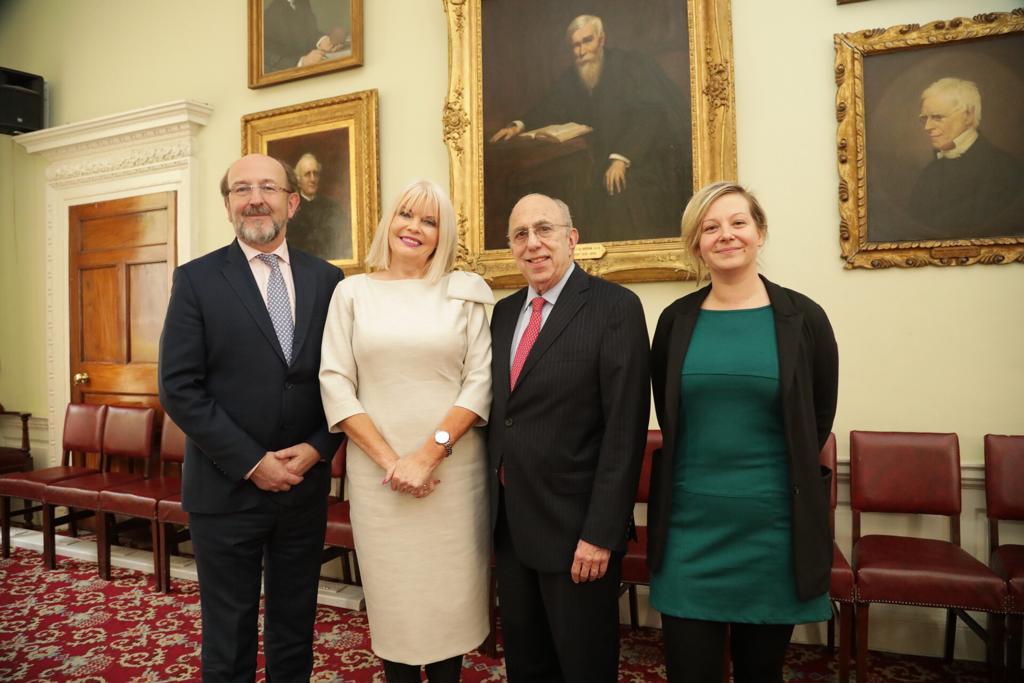

'Shining light' DCU shows how University should be 'rooted' in Community, says Minister
A new book looking at Higher Education and its ‘local mission’ will be a valued reference point for policy-makers and academics going forward, Minister Mary Mitchell O’Connor has said.
Ms Mitchell O’Connor was speaking the launch for the book ‘The Local Mission of Higher Education: Principles and Practice’, edited by Sjur Bergan, Ira Harkavy and Ronaldo Munck.
The publication is a collection of essays, a product of a workshop organised by the Council of Europe and the Anchor Institutions Task Force at Dublin City University in 2018.
This workshop and the resulting essays and results were cited by Ms Mitchell O’Connor in her address at the Royal Irish Academy on Dublin's Dawson Street earlier today.
She also made reference to DCU President Brian MacCraith’s preface to the book. “In it, he says: ‘We live in a complex era of political disruption’. So you not only capture what this book is about, I think you captured what exactly is going on, probably on our two islands, the UK and Ireland at this very moment in time.
“Higher Education institutions must be an integral part of society, of the community and of the economy in which we all operate. And they must all function at a complex multiplicity of levels. And I believe they must reflect society, civil society and more.
“And as the current President of the Irish Universities Association, Professor MacCraith, I think you have a good overview of what is happening in Irish education. So it is entirely appropriate that DCU should be so heavily involved in this book and the process by which it has emerged.
“It is because DCU is a shining light in our Higher Education landscape, showing how a university should be rooted in its community.”
The Higher Education Minister said the promotion of equity of access to education is a priority for the Government and her department.
“I want to see more opportunity for our students to go to college, and to enable all of our students, regardless of their background, to have a world class positive student experience while they are in college,” she said.
Congratulating all who contributed to the book, Ms Mitchell O’Connor the publication is a “a really good reference point and reference source for academics, for policy-makers like myself, and people in the department, and indeed students into the future.”
DCU President Brian MacCraith said Higher Education Institutions have “a vital role to play in their local communities and the wider society in which they operate”.
“Our purposeful and active engagement results in tangible social, economic and democratic benefits. The view from an ivory tower may have been acceptable in the past but today, it is an anachronism. We must be engaged and active at street level,” he said.
DCU is home to the country’s oldest Access programme – which currently has 1,300 students enrolled. It is also part of the College Connects partnership with Athlone IT, Dundalk IT and Maynooth University which aims to improve access to Higher Education in communities across the Midlands, East and North Dublin. DCU is the world’s first Age Friendly and Autism Friendly University, as well as a University of Sanctuary.
“Research can also play a very significant role in strengthening linkages with our communities and is reflected in our commitment to the idea of Engaged Research. This approach involves an ongoing dialogue with citizens and communities to identify the challenges they face, and to find sustainable solutions. In this model, the Community is involved from the stage of problem identification through problem solution and to implementation.
“At DCU, this engaged approach is central to DCU’s mission to ‘transform lives and societies through education, research, innovation, and engagement’. Indeed, Sjur, Ira and Ronnie capture the essence of Engaged Research in their chapter, ‘The Way Forward’ when they say: “Academic knowledge alone will not enable us to solve society’s problems and build a better life for all, it needs to be engaged with society.”
Joanna Ozarowska, Manager of DCU in the Community, said it “is probably one of the most tangible manifestations of DCU’s commitment to the wellbeing, development and social regeneration of its most immediate surrounding community”.
The book’s co-editor Ira Harkavy, who is Associate Vice President and Founding Director of the Barbara and Edward Netter Centre for Community Partnership, said universities and their local environments are intertwined.
“Leadership in Higher Education institutions across the United States has increasingly recognised that colleges and universities cannot hold themselves aloof from their neighbours. The fate of the university and its local environment are absolutely intertwined,” he said.
“There are two co-purposes for higher education in my estimation in the United States. The purposes are education for democratic citizenship, and the creation of knowledge to advance the human condition, which significantly involves development and maintaining democratic societies.
“Given the current increase in racism, xenophobia, anti-semitism, islamophobia, as well as attacks on reason, science and knowledge, working to realise the democratic purpose of higher education has never been more urgent and never been more important.”
 | The Local Mission of Higher Education: Principles and Practice Edited by: Sjur Bergan, Ira Harkavy and Ronaldo Munck |
